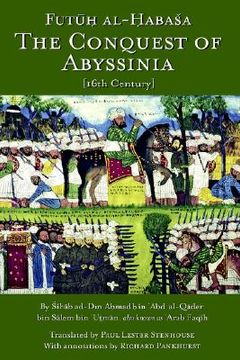Reseña del libro "the conquest of abyssinia: futuh al habasa (en Inglés)"
Sihab ad-Din Ahmad bin 'Abd al-Qader's account of the early sixteenth century Jihad, or holywar, in Ethiopia, of Imam Ahmad bin Ibrahim, better known as Ahmad Gran, or the Left handed, is an historical classic. The Yamani author was an eyewitness of several of the battles he describes, and is an invaluable source. His book, which is full of human, and at times tragic, drama, makes a major contribution to our knowledge of a crucially important period in the hisoty of Ethiopia and Horn of Africa. 'Futuh al-Habasa, ' or 'Conquest of Abyssinia' - which undoubtedly reflects the situation as it seemed to its Yamani author at the time of its composition. The forces of Imam Ahmad bin Ibrahim had occupied the greater part of Ethiopia. The resistance of Emperor Lebna Dengel had virtually come to an end, and many Christians had chosen to convert to Islam. The victorious Imam's regime seemed there to stay. This was, however, far from the end of the story. The Imam was killed in battle on February 21, 1543, whereupon his army almost immediately disintegrated. Those of his soldiers who could do so made their way back to the East. Not a few Muslim converts reverted to their former faith. The Futuh thus refers to a relatively short, though crucially important, period in Ethiopia's long history. The book is nevertheless valuable, in that its author was an eye-witness of many of the events he describes, and writes, as far as we can judge, with a degree of objectivity rare for his time. What people say about this book: "This book is the first ever complete English translation of the Arabic account on the campaigns of Imam Ahmad b. Ibrahim al-Ghazi (popularly known as Gran) as written by the Yemeni jurist, Shihab al-din Ahmad b. Abd al-Qadir b. Salim b. Uthman (also known as Arab Faqih)... it is a welcome addition to the rich corpus of Arabic literary and historical sources relevant to the sixteenth-century Ethiopia and the Horn. It is particularly useful for English-speaking researchers and established scholars who cannot read either the Arabic text or the authoritative French translation prepared by Rene Basset...both Stenhouse and Pankhurst, and the publisher, deserve high commendation, respectively, for producing such a valuable work that represents a major contribution to the history of Ethiopia and the Horn, and for making it available to the wider English-speaking readership and scholarship." -- Hussein Ahmed is a Professor of History at Addis Ababa University. He is a leading historian of Islam in Ethiopia. * * * "In the history of conflict in Africa and beyond, "few stories of drama and human tragedy equal" Imama Ahmad's conquest of the Christian kingdom of Ethiopia (1529-1543). His short lived spectacular victories and determination to replace Christianity by Islam and the remarkable survival of Christianity in Ethiopia" is a story of epic proportions" which still generates strong emotion among both the Christian and the Muslim population of Ethiopia. In other words, Imam Ahmad's jihadic war besides being legendary was a major turning point... This is truly a wonderful work, which is destined to remain an indispensable source for the history of Ethiopia and the Horn of Africa during the first half of the tumultuous sixteenth century. Anyone interested in understanding the intensity and brutality of religious war will be rewarded by reading this classic." -- Mohammed Hassen is an Associate Professor of African history at Georgia State University in Atlanta. He is the author of The Oromo of Ethiopia: A History 1570-1860.

